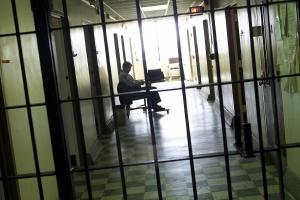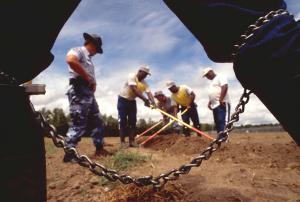Issue Date: September 5, 2003
Southern bishops criticize growing privatization By PATRICIA LEFEVERE In the 17 years he’s been in San Angelo, Texas, Bishop Michael Pfeifer has seen prison facilities in West Texas “grow like little anthills.” In the San Angelo diocese there are 26 federal, state or private centers of incarceration -- some of them planted in the remotest reaches of the 29-county see. The 26 facilities do not include county and town jails. Prison expansion is not an anomaly peculiar to West Texas, but it is part of a trend that has in recent years covered the nation with tens of thousands more prison beds. Nowhere is this more evident than in the South, which has seen its prison population increase by more than half a million during the last two decades. Pfeifer, a member of the Oblates of Mary Immaculate, is one of 45 Catholic bishops from 12 Southern states who are apprehensive about the rise of for-profit private prisons in the South and in the nation, especially at a time when crime rates are falling. In a document released on Good Friday this year, the bishops questioned whether private prisons protect the rights and dignity of inmates, noting that the profit motive can conflict with the need to provide adequate rehabilitation programs. “We call on all levels of government to refuse to sign new contracts or to renew expiring ones with private prison corporations,” the bishops wrote in the three-page document, “Wardens from Wall Street: Prison Privatization,” released April 18. The document is the second in a planned series of six pastoral statements on the criminal justice process issued by the Catholic Committee of the South, a network of dioceses, religious orders and community organizations based in Martin, Ky. All but three of the 48 bishops of Alabama, Arkansas, Florida, Georgia, Kentucky, Louisiana, Mississippi, North Carolina, South Carolina, Tennessee, Texas and Virginia signed the document. The group released its first statement last December, “Challenges for the Criminal Justice Process in the South.” In future pastoral letters, to be published later this year and in 2004, the bishops plan to address restorative justice, juvenile justice, prison conditions and the post-release system for ex-offenders. Five years ago the bishops of the South began to educate themselves on the criminal justice system in their area. Bishop Robert Lynch of St. Petersburg, Fla., convened a meeting in Atlanta, at which the 10 or more bishops attending first turned their attention to the growth of private prisons within the South, Lynch told NCR. While the bishops’ statement gives no tally on the number of such facilities or the number of their inmates, it notes that in 2001 more than 100,000 U. S. prisoners were being housed in prisons operated by private corporations. More than half of the facilities and their inmates are in the South. Today the number of prisoners in for-profit prisons has surpassed 123,000 nationwide. Private prisons have proliferated, the bishops stated, because more people are being put behind bars -- the result of tougher crime laws and minimum sentencing provisions in place since the 1980s. Governments, faced with the rising costs of incarceration and with increasing political pressure to privatize many government services, have turned to private contractors that promise to build and operate prisons at lower than public sector costs. Harsher crime statutes have meant huge state and federal outlays for law enforcement and ever-diminishing budgets for drug and alcohol treatment, education and counseling services. Yet, as Pfeifer noted, half of Texas’ prisoners lack a high school education, many are illiterate and the vast majority are doing time for substance abuse. A second factor has contributed to the dangerous overcrowding and acute shortage of prison beds. The U.S. Immigration and Naturalization Services sought to jail large numbers of Central Americans who claimed refugee status as they fled civil war, ethnic conflicts and persecution in their homelands in the 1980s. To cope with the influx of Salvadorans, Guatemalans and Nicaraguans, as well as Hondurans and Mexicans, the government contracted with the Corrections Corporation of America in 1984 to build and run INS processing centers in Houston and Laredo, Texas. The two facilities hold 760 inmates today. “Tough-on-crime” politicians, prosecutors and state attorneys general, as well as construction, telephone and food companies that service jails, are invested in making the prison industrial complex grow, according to Glenmary Fr. John Rausch, who coordinates the Justice and Peace Commission for the diocese of Lexington, Ky. County jailers who receive a per diem award for each person locked up in their jail also want to see the system expand, he said.
“There’s a complete network of complicity. … Each segment is competing for its share of the criminal justice piece,” said Rausch. He said that competition has raised costs rather than lowered the number of crimes committed or inmates convicted. But the primary reason the bishops want no more privatization in the prison system remains a moral, not an economic one, said Glenmary Fr. Les Schmidt, who serves as adviser and liaison to the Catholic Committee of the South. In its pastoral, the bishops state: “To deprive other persons of their freedom, to restrict them from contact with other human beings, to use force against them up to and including deadly force, are the most serious of acts” and require a gospel response. To delegate such acts to institutions whose success depends on the amount of profit they generate “is to invite abuse and to abdicate our responsibility to care for our sisters and brothers.” The bishops reminded Catholics, “Previous attempts to introduce the profit motive into prisons failed to respect the fundamental human dignity of every prisoner.” Widespread physical abuse and “an extraordinary level of death among prisoners” led to legislation declaring the commercial exploitation of prisoners illegal, they wrote. Still, prison chain gangs exist in many states. Most recently Kentucky passed legislation designed to save $5 million on the cost of housing inmates. The law allows prisoners to reduce their stay in jail voluntarily through work. For every five days worked, one day can be deducted from their sentence. “What’s voluntary about doing this?” asked Fr. Patrick Delahanty, policy analyst to the Kentucky Catholic Conference. Delahanty views the law, which went into effect in July, as little more than “a creative way to buy your way out.” When “prisoners become units from which profit is derived, there is a tendency to see them as commodities rather than as children of God,” the bishops wrote. “Once people are dehumanized, they are more liable to be exploited, abused and violated and to becoming more violent themselves.” The bishops cited an industry-wide survey conducted in 1997 by James Austin, a professor at George Washington University. Austin found 49 percent more inmate-on-staff assaults and 65 percent more inmate-on-inmate assaults in medium- and minimum-security private prisons than in medium-and minimum-security facilities run by government. The bishops said they are troubled too by the working conditions and wages of workers in private facilities. In an effort to reduce costs and maximize profits, private prisons “redistribute their operational costs with less money going to those employees who work directly with prisoners and more to executives and shareholders,” they wrote. “We do not agree that paying private prison staff lower wages than public employees receive, or cutting their numbers, advances the common good or just treatment of prisoners,” the bishops stated. They noted that some states have canceled contracts because of inadequate staff and mismanagement. Franciscan Sr. Robbie Pentecost, executive director of the Kentucky-based Catholic Committee of Appalachia, pointed to a private prison in Beattyville, Ky., which she said has had problems getting and keeping guards. She noted a chaplain’s report of increased alcoholism and increased fear among the guards. Male prisoners also have complained because female guards are required to watch them bathe, she said. As long as private prisons continue to exist, “they need to be fully accountable,” the bishops said, asking the government for “independent, thorough and systematic oversight” of their operations. Joshua Miller, a labor economist with the Association of Federal, State, County and Municipal Employees Union in Washington who has studied the industry, said that private operators get contracts because they frequently show a 10 percent lower per diem cost than that of the public prisons. But the comparisons are often apples to oranges. Most private prisons handle minimum- and medium-security inmates who have served most of their time and require fewer services than long-term and more troubled inmates in public prisons, he said. Moreover, such “hidden costs” as quelling riots and capturing escapees, as well as those of transporting prisoners are often omitted in proposals that include a “hypothetical model,” Miller said. While the union was one of the first groups to seek an end to private prisons, the bishops’ call has come at a time when the issue is gaining national attention. Rep. Ted Strickland (D-Ohio) introduced a bill May 6 to ensure that persons charged or convicted of an offense against the United States serve their time in government-run prisons and not in those operated by private contractors or vendors. The crisis of overcrowding and bed shortages in the public system that allowed privates to enter the field two decades ago is no longer critical, Miller said. Because the for-profits house only 5 to 6 percent of the U.S. prison population, “there’s a way to transition existing private beds to public ones,” he said. Some private prisons are now owned by federal, state or county authorities and only managed by the private sector. Dominican Sr. Mary Priniski, who coordinates the Catholic Committee of the South, said she was amazed by the courage the bishops displayed in their statement. The issue remains a moral one, she said. “Using people for profit is wrong. Profiting on human suffering is wrong. “The bottom line for these firms is to make money for their stockholders,” said Priniski. A community organizer by trade, she works for the Service Employees International Union in Washington. The bishops will undoubtedly face a backlash from victims’ groups, Rausch said. “There are three constitutional amendments that protect the rights of prisoners,” but none that directly addresses victims. “They’ll be asking the bishops, ‘What about us?’ ” The church must continue to proclaim the dignity of all, said Rausch. “With our prison system, the line is blurred between rights for victims and prisoners, and guards take home plenty of the stress inside these institutions.” Driving across Appalachia and looking out from Kentucky’s mountains across the vast South, Rausch sees “a dark joy” on the horizon. With state budgets severely stressed due to federal cutbacks, “all states will have to look hard at the criminal justice issue.” Patricia Lefevere is an NCR special report writer.
National Catholic Reporter, September 5, 2003 |

